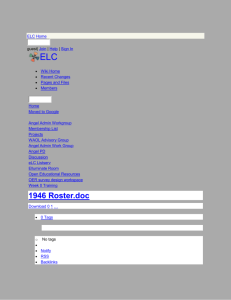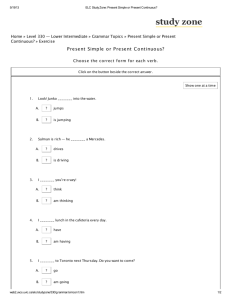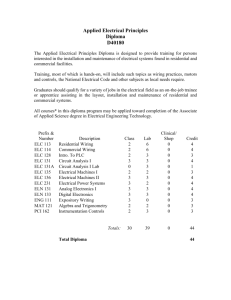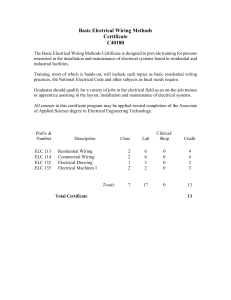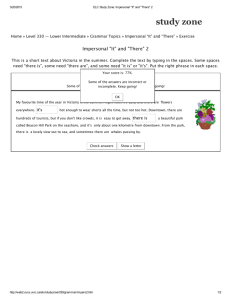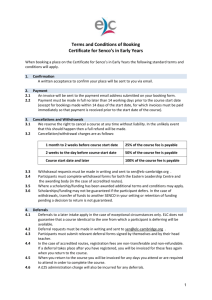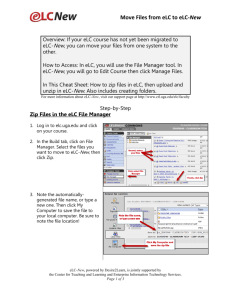The Marshall School of Business University of Southern California MOR 470
advertisement
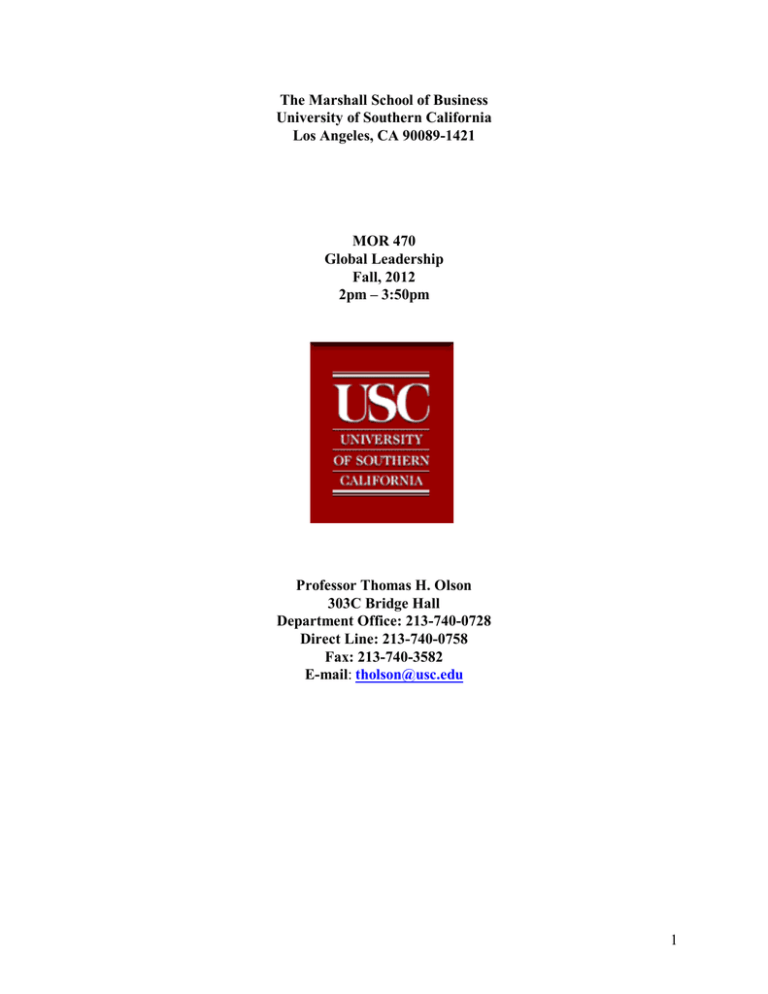
The Marshall School of Business University of Southern California Los Angeles, CA 90089-1421 MOR 470 Global Leadership Fall, 2012 2pm – 3:50pm Professor Thomas H. Olson 303C Bridge Hall Department Office: 213-740-0728 Direct Line: 213-740-0758 Fax: 213-740-3582 E-mail: tholson@usc.edu 1 MOR 470 – Global Leadership Dr. Thomas H. Olson University of Southern California Office: BRI 303C Office Hours: T and TH noon -1:45pm and by appointment. If you have any questions or concerns, please don't be shy about coming by or calling! Phone: (213) 740-0758 E-mail: tholson@usc.edu Fax: (213) 740-3582 General Description: This course is designed to introduce you to what is required to lead people who work in organizations in diverse global settings. This is particularly important as today’s business world is a global community. And in this world, leadership is often cited as the key competency that is sought in potential employees. This course will help prepare you for any leadership role you may have in the future, and will increase your awareness and understanding of the global business community and the leadership skills that are necessary for the leaders of tomorrow. Instructional Objective: The objective of this course is to introduce you to what is involved with leading in a global setting. You will have an opportunity to develop general leadership skills, gain an understanding of cross-cultural issues, and develop insights into the qualities of a truly global leader. Specific Learning Objectives: 1) Develop an understanding of what leadership is and the skills necessary to demonstrate leadership. Develop an increased awareness of oneself, your strengths and weaknesses in leadership roles, and the ways in which others react and respond to you. Develop the ability to not only better lead but value and appreciate the influence of culture on human behavior in group and organization settings. btain a multi-faceted, diverse understanding of the meaning of leadership - both domestic and global. 2 Online Course Folder: There is a folder set up for this course on Blackboard (which can be accessed via any Marshall School computer). Be sure to check this regularly, as this is where I will post any presentations, notes, details and feedback on homework, changes to syllabus, etc. Course Format and My Perspective: All of us learn in a variety of ways, and therefore, this course will be conducted with a variety of teaching techniques. Experiential learning, videos and guest speakers (when available) will all supplement lectures and textbook work. Group work and case studies will also be used. The course is divided into three parts: Part I: LEADERSHIP: LOCAL BEFORE GLOBAL Part II: CROSS CULTURAL ISSUES Part III: LEADING IN A GLOBAL CONTEXT Your experience in this class will involve you needing to do the following: 1) You are expected to participate in a variety of class and Experiential Learning Center (ELC) activities. For our class discussions, you are to complete all of the class reading before coming to class. You will find that there is a lot of learning in this class that will come from each other. Also, to facilitate our learning in class, there will be a number of interactive exercises in class as well as in the ELC. The ELC sessions will aid in the skill development of leadership skills, and will allow you to learn through self-discovery. In order to spend our time on applied exercises as well as for class discussion, you’ll need to be prepared for class and the ELC and come ready to ask and answer specific questions about the readings. Of course, class and the ELC will always be a place to review the readings, and for questions to be asked and addressed. Lastly, guest speakers and videos will be used when possible to provide additional valuable learning opportunities. You will learn a great deal about leadership, cross-cultural influences, and global business through our discussions and exercises – though, ultimately, your learning is a function of you developing specific skills. And my goal as your Professor is to help you learn. Therefore, this course is designed to help you build certain skills: team skills, leadership skills, research skills, synthesizing skills, and independent learning skills. All these skills, as well as the ability to value diversity, are vital requirements of any leader. And they are particularly important in a global setting. 2 & 3) In order to acquire the skills above, you will work simultaneously as a team member on two different project assignments throughout the semester: one assignment to study a global company and the other to study a country. These two team projects will emphasize two key skills – those skills that evolve about conducting research (gathering and analyzing information) and those interpersonal skills that evolve about working with a variety of people in groups. I will discuss these two assignments in more depth early in the semester. 3 4) You will learn to develop analyses - related to leadership and culture - via our study and discussion of cases (found in your course reader). These analyses of cases will allow you to see the application our readings and class discussions. I have selected a mix of U.S. and international based cases. They should help demonstrate to you the importance of leadership and the need for understanding and managing in a cross-cultural world. 5) You will be asked to investigate what you believe leadership would involve in a variety of countries throughout the world. We will engage in a discussion of not only the cultures of these countries, but also of what you believe leadership would involve in these countries. Information sharing and discussion of differences across the world are key to understanding the diverseness of leadership. For this reason our discussions of leadership in different countries will serve as a facilitation tool for learning more about differences in leadership. It will also help you to hone your understanding of leadership and related skills. And you will be expected to be involved in these discussions. 6) You will be asked to read all materials from the course text and be prepared for quizzes that cover the material and/or use this information for a ‘global leadership site visit’. All in all, I think that you will find that at the end of the semester, the bulk of your learning will not come from a textbook, or from my lectures. I suspect that you will learn more from each other than you could ever imagine, and as you learn about others, you will better understand yourself. This is an essential ingredient to developing leadership. Course Format Specifics: 1) Peer, student, and professor evaluations Part of being a good leader is having a clear understanding of how others perceive you and react to you. In order to help you develop the skill of giving feedback and develop learning from receiving feedback, I will endeavor to provide you with the opportunity to give and receive feedback from others in the class (at this time primarily your team members regarding your group work). Also, I strongly suggest that you monitor your personal performance in class discussions using the Behavioral Anchored Rating Scale (that I have added to this syllabus). If you are interested and would like to receive personal feedback from me, I can arrange to do so with you at mid-term. With the purpose of feedback being primarily developmental, and not evaluational, each of you would have an opportunity to learn more about yourself and hopefully then work to develop your skills. With respect to your group projects, you will be initially evaluated on a group level with all members receiving the same grade. Nonetheless, I reserve the right to adjust individual grades in light of the feedback of the other group members. 2) Company teams At the beginning of the semester, nine (9) teams will be formed for the purpose of examining one global corporation throughout the course of the semester. Each team will consist of approximately 5 members, and will choose a company that has a global presence. The team will research the company and its leadership, and attempt to learn enough about the company that each team member could speak about it as though he or she worked for that company. The leaders of the company will serve as class examples throughout the course, and at the mid-point of the course, your team will prepare handouts and make a presentation for the class about leadership in your company. 4 3) Country teams Also at the beginning of the course, the same nine (9) teams - as described in #2 above will be assigned to study a country and that country's notion of leadership. No individual may participate in a team that represents a country where he or she has ever lived. These country teams will prepare handouts and develop and make presentations at the end of the semester about what you believe leadership to include in the country culture you study. Presentations may include dress of that country, food, religious rituals, collages, summary points on posters, articles about leaders from that country, etc. Each country chosen by a team will need to be approved to avoid more than one team choosing a country. 4) Case preparation You’ll see that throughout the course, you’ve been assigned to “Prepare” the cases from the Course Reader. This requires you to answer the study questions in detailed paragraph / bullet point form that I’ve provided for you regarding each case. These should be typed / printed and will be collected each class in which we discuss the case. 5) Leadership summaries Through the semester, we will be explore what leadership means and how and in what way it is applied as we study global business topics. We will cover a variety of leadership situations in various countries, and for each country chosen, you will prepare a summary of what leadership might involve in that country. You’ll notice, when you read through the text, that while there are a number of topics covered, leadership isn’t necessarily one of them. Therefore, your assignment will be to prepare a detailed statement (1-2 page(s), double spaced, 10 or 12 fonts) for each country assigned. In your page summary, you should describe what you think leadership probably involves in the country identified. You should use information provided in the textbook as well as from other sources. Make sure that you provide some logic for your assertions. Each of you may be asked to be a part in leading and participating in a discussion about what you think of leadership in one of the countries assigned. This should be an informal 15 20 minute discussion, skit, role-play or some other form of presentation. In addition to the detailed statement, I ask that you develop at least 3 key questions about leadership that you identify in the summary of the country. The questions should be ones that are not initially obvious. They should be thought provoking and make all of us think beyond the country. If assigned in advance, I may ask that you provide the 3 questions you will be discussing to the class in the class session before your discussion. All students are to think about the questions, and be prepared to contribute to the discussion. I may select people at random to present. 6) Applying readings – Quizzes and/or Leadership Site Visit / Assessment Quizzes and/or Leadership Assessment assignments will be given during the semester that cover the reading material from the text. You’ll need to have read the material and know it sufficiently to answer quiz questions and/or to assess leadership in a setting of your choice. 5 Attendance Policy: Of course, attendance is expected. There are few - if any - leaders who can lead without participating in their organization. I feel strongly about learning, being in class, and being there on time. Moreover, lateness is not OK. I will visually ‘take roll’ when class starts, and we will then begin class. If you are chronically late, you will be penalized. Also, if you are absent 3 or more times, your final participation grade will be reduced per absence. If you are going to be absent, write me before class AND arrange for someone to turn in your homework! Evaluating Student Learning: Grades will be determined by the following criteria: 1) Participation (measured by attendance, degree of preparation, active engagement & overall contribution to class by verbal or other contributions & non-case homework) 20 % 2) Company Project (team grade) 20 % 3) Country Project (team grade) 20 % 4) Case preparation* 20 % 5) Leadership summaries* 10 % 6) Quizzes and / or Leadership Site Visit Assessment 10 % Total 100 % * Also, please note that the best papers are single spaced, minimum 2 pages, and written in ‘depth and breadth’ (with references). You must use citations from the course (e.g., textbook and other appropriate readings, lectures, ppt presentations) to earn ‘A’ scores. For quizzes: If anyone is absent on a class day when a quiz is given, one (and only one) make-up will be allowed; if absent more than once, the second and other absences will count as ‘0’ scores. For written case and/or leadership analyses: If anyone is absent and does not turn in a written assignment when due, you’ll have 24 hours to get that case submitted to me by e-mail with a hard copy delivered and date stamped to a staff member in the MOR Department office. Please note that for a late case to be accepted it must have been completed by the class meeting day and time in which is assigned. I will confirm this by checking the properties of your e-mail document. If the case is not completed by the class meeting date, it will not be counted and the following applies. If an assignment is not submitted, this assignment will need to be completed, but lesser credit will be awarded (may be no better than the lowest of the scores of those submitting on time). Grading Standards: As required by the USC Marshall School of Business. Required Course Textbooks & Materials: Peng, Mike W., Global Business, South-Western Cengage Learning, latest edition. Course reader (additional readings and cases). 6 CLASS SCHEDULE The class schedule is presented on the following pages. Think of the word ‘Prepare’ as meaning ‘Due’. The things that are noted for you to prepare are the things I will collect in class on that day. Week 1 Date 8 /28 Topic/Assignment Due Topic: Course Overview / Introductions Read: Chapter 1 Globalizing Business 1 8/30 Topic: A Framework for Learning about Leadership Read: Lawler, Chapters 1 & 2, From the Ground Up Applied Exercise: meet in the classroom Start: Forming Company / Country teams 2 9/4 2 9/6 ELC 1 Topic: Organization Design – a Critical Leadership skill Experiential Learning Center Exercise; work on forming teams *Meet in the ELC * (exercise Greeting Cards) Read: Greiner, Evolution and Revolution as Organizations Grow, HBR, May-June 1998. 3 9/11 Topic: Leaders Designing their Own Organization Review: “Organization Design’ ppt presentation posted on Blackboard and/or e-mailed Prepare: Meg Whitman at eBay Inc. (A) Complete: Forming Company / Country teams 3 9/13 ELC 2 Topic: Improved Performance & Leader Behavior Experiential Learning Center Exercise; work on forming teams *Meet in the ELC* (exercise LO) 4 9/18 Topic: Leaders as Change Managers Review: ‘Organization Culture AND Change’ ppt presentations Prepare: Johnsonville Sausage case 4 9/20 Topic: Leaders as Change/Culture Managers Read: O’Reilly, Corporations, Culture and Commitment, CMR. Prepare: Southwest Airlines case PART I: LEADERSHIP: LOCAL BEFORE GLOBAL Topic: Leaders as Strategists in a Global Business Prepare: Merck in the Third World (A) case (practice case) Topic: Global Politics, Laws and Economics Read: Chapter 2 (and Reference Chapter 17) Work on: Forming Company / Country teams 7 Week 5 Date 9/25 Topic/Assignment Due Topic: Leading Foreign Nationals-Leveraging Resources Read: Beer, Making Performance Appraisal Work Prepare: Intel in China case Read: Chapter 3 & 4 (cases from text assigned); may move to 9/27 Prepare: List of team including name, e-mail address and phone #. PART II: CROSS CULTURAL ISSUES 5 9/27 Topic: Leading Trade Internationally Read: Chapter 5 (cases from text assigned);may move to 10/2 Prepare: Quiz and/or Leadership Assessment / Summary 6 10/2 Prepare: Quiz Topic: Leading Investing Abroad Read: Chapter 6 (cases from text assigned) Prepare: Quiz and/or Leadership Assessment / Summary 6 10/4 ELC 3 Topic: Leadership Behavior & Culture, Ethics and Norms Experiential Learning Center Exercise (referemce Ch. 3) *Meet in the ELC * ( PA exercise) Prepare: Teams are to submit the name of the Company and the Country they will be studying, 5 titles of articles about the company and its leadership, and 5 others about the country and its leadership. 7 10/9 Topic: Leadership and Foreign Exchange Read: Chapter 7 (cases from text assigned) Prepare: Quiz and/or Leadership Assessment / Summary 7 10/11 Topic: Team Leadership and Culture Exercise / Case in class – no prework needed 8 10/16 Company Presentations – 3 teams 8 10/18 Company Presentations – 3 teams 9 10/23 Company Presentations – 3 teams 9 10/25 ELC 4 Topic: Leadership and Culture - a case study Experiential Learning Center Exercise *Meet in the ELC* (Disarmament) 8 Week 10 Date 10/30 Topic/Assignment Due Topic: Leadership, Global Integration & Growth Read: Chapter 8 & 9 (cases from text assigned) Prepare: Quiz and/or Leadership Assessment / Summary 10 11/1 Topic: Gender, Leadership and Global Careers Read: Sumiko Ito case 11 11/6 Topic: Leading Entry into Foreign Markets Read: Chapters 10 & 11 (cases from text assigned) Prepare: Quiz and/or Leadership Assessment / Summary 11 11/8 ELC 5 Topic: Leading Across Cultures Read: Road to Hell case *Meet in the ELC* (Road to Hell case) PART III: LEADING IN A GLOBAL CONTEXT 12 11/13 Topic: Leading Global Alliances, Strategy & Marketing Read: Chapters 12-14 (cases from text assigned) Prepare: Quiz and/or Leadership Assessment / Summary 12 11/15 ELC 6 Topic: Developing Leaders Globally Experiential Learning Center Case *Meet in the ELC* (case) Read: The Case of the Floundering Expatriate case - to be distributed 13 11/20 Topic: Leading HR, Governance & Social Responsibility Prepare: Levi Strauss & Co. Global Sourcing case Read: Chapters 15-17 (cases from text assigned) Prepare: Quiz and/or Leadership Assessment / Summary 13 11/22 Thanksgiving Holiday – Enjoy! 9 Week Date Topic/Assignment Due 14 11/27 Country Report Presentations – 3 teams 14 11/29 ELC 7 Topic: Leadership, Transitions & Relocation Experiential Learning Center Case *Meet in the ELC* (case) Topic: Leadership, Transitions & Relocation Read: Catskill Roads Case 15 12/4 Country Report Presentations – 3 teams 15 12/6 Country Report Presentations – 3 teams 16 TBD DUE: (on Final Examination date identified in USC schedule) Final Examination / Assignment (electronic copy of Country Presentation) Summary of ELC Bookings Date Start End Room Status 9/6/2012 Thu 2:00 PM 4:00 PM JKP - ELC JKP ELC Exercise 301 ALL ELC 9/13/2012 Thu 2:00 PM 4:00 PM JKP - ELC JKP ELC Exercise 301 ALL ELC 10/4/2012 Thu 2:00 PM 4:00 PM JKP - ELC JKP ELC Exercise 301 ALL ELC 10/25/2012 Thu 2:00 PM 4:00 PM JKP - ELC JKP ELC Exercise 301 ALL ELC 11/8/2012 Thu 2:00 PM 4:00 PM JKP - ELC JKP ELC Exercise 301 ALL ELC 11/15/2012 Thu 2:00 PM 4:00 PM JKP - ELC JKP ELC Exercise 301 ALL ELC 11/29/2012 Thu 2:00 PM 4:00 PM JKP - ELC JKP ELC Exercise 301 ALL ELC 10 Notes 1. The course schedule is subject to change depending on pace of class. It is the collective responsibility of all class members to take note of any course changes to the syllabus as well as to assist the course to move at an acceptable pace. Check e-mail and/or Blackboard often for messages and/or presentation materials. 2. Additional cases will be distributed/made available depending on interest and time. 3. Attendance is very important to your performance in this course. Therefore, after the 2nd non-excused absence, each additional absence will result in a reduction of participation evaluation. 4. Participation will be assessed using the attached behavior anchored rating scale. 5. School policy and guidelines require that you have your laptops closed during class and you turn off other electronic devices and phones. All cell phones must be turned off before the start of class; no text messaging is allowed during class. All phones should be off the desktop and out of sight. With prior approval, computers may used only for note taking; no internet surfing or working on other documents or e-mail is allowed. Students will be excused from class for violation and the class session will be counted as an absence. Academic Integrity Academic Integrity is a critical value of the University Community. Integrity violations destroy the fabric of a learning community and the spirit of inquiry that is vital to the effectiveness of the University. Academic integrity policies, the description of prohibited behavior, and the appropriate sanctions are described in SCAMPUS. The use of unauthorized material, communication with fellow students during an examination, attempting to benefit from the work of another student, and similar behavior that defeats the intent of an examination or other class work is unacceptable to the University. It is often difficult to distinguish between a culpable act and inadvertent behavior residing from the nervous tensions accompanying examinations. Where a clear violation has occurred, however, the instructor may disqualify the student’s work as unacceptable and assign a failing mark. Student Work Returned paperwork, unclaimed by a student, will be discarded after 4 weeks and hence, will not be available should a student pursue a grade appeal following receipt of his/her course grade. Students with Disabilities Any student requesting academic accommodations based on a disability is required to register with Disability Services and Programs (DSP) each semester. A letter of verification for approved accommodations can be obtained from DSP. Please be sure the letter is delivered to me as early in the semester as possible. DSP is located in STU 301 and is open 8:30 a.m. - 5:00 p.m., Monday through Friday. The phone number for DSP is (213) 740-0776. 11 MOR 470 – Global Leadership Case Preparation Questions As you read all of the cases for this course, think about the following broad questions: What are the pertinent facts in the case? What is/are the primary problem (s)? What are the causes of the problem (s)? What are the alternatives for action? What action would you recommend? Also, be sure to make reference to the readings that are assigned. The best evaluated case analyses will likely be those in which the readings have been used. Merck in the Third World (A) 1. Use the STAR model to analyze Merck 2. Describe Vagelo's leadership style 3. Analyze the decision process and its effectiveness about developing the drug. 4. Should Merck develop the drug? Meg Whitman at eBay 1. Use the ‘organization design’ ppt presentation (posted) to assess eBay’s leadership in developing an appropriate culture and use of appropriate functional structure? 2. Using the STAR model, assess how well eBay’s organizational design (and culture) ‘fit’ with what eBay is trying to do with its customers? 3. How does the design (and culture) at eBay impact business success? 4. If you were hired as a consultant by eBay, what alternative organizational designs would you suggest? Why? And how would you argue for any new culture or design? Johnsonville Sausage 1. Use the STAR model to help you describe the organizational culture, strategy, structure, people, processes and rewards at Johnsonville Sausage? 2. Use the ‘organization culture’ ppt presentation (posted) to assess Johnsonville’s leadership in developing an appropriate culture? 3. What kind of a leader is Ralph Stayer? How does his behavior affect how people behave? 4. Ralph Stayer is verbally committed to a philosophy of delegated responsibility and authority and significant consultation. Is he serious? Is he realistic? Can he do it? What risks exist? 5. Evaluate Johnsonville overall from a motivational point of view. 6. What should Ralph do about Palmer’s request? 12 Southwest Airlines 1. Using the O’Reilly reading as a reference, describe the organizational culture at Southwest. 2. Use the STAR model to assess Southwest. 3. How does the culture support performance at Southwest? 4. Compare the cultures of Southwest and Johnsonville and describe how they support ‘continuous improvement’ by each organization. Intel in China 1. Use the STAR model to assess Intel in China. 2. How would you have handled the situation with Lui? 3. Do you believe the incident with Lui was indicative of broader internal communication difficulties, and. if so, what could Tang do about it? 4. Tang largely ignores his rank or his experience in the U.S., and hopes that by making it a non-issue, it perpetuates a feeling that he is “one of a bunch of Intel employees, working hard to avoid dissonance in relationships”. How realistic do you consider this attitude to be in dealing with the potential for cross-cultural conflict? 5. Were Tan’s actions typical of new Chinese management techniques (i.e., a blending of western and eastern cultures) or would they have been less than successful in many traditional eastern-based companies? Road to Hell 1. What do you think the letter was about? 2. How would you have handled the last vital interview with Matthew Rennalls if you were Baker? 3. How would you try to rectify the situation? Sumiko Ito 1. Would you consider Sumiko a leader? Why or why not? 2. What impact do Sumiko’s ethnicity and gender have on her success? 3. If you were in charge of leadership development at Nomura, what would you do to keep Sumiko Ito with your firm? What would you do to further develop her for a leadership position? 4. Answer the following question as though you were Sumiko: What advice do you have for women looking to go into global business? Levi Strauss & Co. Global Sourcing 1. Should Levi Strauss & Co. continue and possible increase its involvement in China? 2. How does national culture influence the decision? 3. Evaluate LS & Co.'s decision-making process. 13 The Case of the Floundering Expatriate 1. What are the basic principles and values underlying Frank Waterhouse’s aspiration for the office. 2. What is your own evaluation of Bert Donaldson’s performance? 3. If you were Frank Waterhouse, how would you respond to Bert Donaldson’s performance? 4. What impact will your decision as Frank Waterhouse have on your business and your career? 5. What specific actions would you take to improve Bert Donaldson’s performance, as well as your working relationship with him? 6. What are the particular challenges and dilemmas in managing relationships with those who have different cultural backgrounds and working styles from yours? Catskill Roads 1. What are the key issues / concerns of the case? 2. What should an organization look for in an expatriate? 3. What is the most critical function of expatriating? 14 MOR 470 – Global Leadership Participation Behavioral Anchor Rating Scale Excellent Performance -Initiates information relative to topics discussed -Accurately exhibits knowledge of assignment content -Clarifies points that others may not understand -Shares personal experiences or opinions related to topic -Offers relevant / succinct input to class -Actively participates in simulations and class exercises -Demonstrates ability to apply, analyze, evaluate & synthesize course material. -Demonstrates willingness to take risks in attempting to answer unpopular questions. Good Performance -Regularly participates in discussions -Shares relevant information -Gives feedback to classroom discussions -Consistently demonstrates knowledge of reading assignments -Demonstrates ability to analyze / apply course material -Demonstrates willingness to attempt to answer questions Fair / Average Performance -Participates in group discussions when asked -Demonstrates knowledge of course material -Offers clear, concise, “good” information on class assignments -Offers input, but tends to reiterate the intuitive -Attends class regularly Poor Performance -Occasional input, often irrelevant, unrelated to topic -Reluctant to share information -Not following the flow of ideas -Personal applications only -Drains energy from the class Unacceptable Performance -Fails to participate even when specifically asked -Gives no input to discussions -Does not demonstrate knowledge of the readings -Shows up to class: does nothing -Distracts group / class -Irrelevant discussion 15 PEER EVALUATION FORM Your Class:____________ Name:_____________ Team Identification: __________ Directions: Evaluate yourself and each of your team members on their contributions to the team using the rating categories and competencies below. This evaluation is adopted with permission from an actual evaluation used by the Hallmark Corporation. Rating Categories: 5 = this team member shows outstanding skills in this area and far exceeds expectations 4 = this team member performs strongly in this area, and consistently exceeds expectations 3 = this team member is competent in this skill meeting and, at times, exceeds expectations 2 = this team member meets many, but not all, of the expectations 1 = this team member fails to meet the expectations Team members (include yourself): A = ____________________________________ B = ____________________________________ C = ____________________________________ D = ____________________________________ E = ____________________________________ F = ____________________________________ G = ____________________________________ COMPETENCIES: RATINGS TEAM EFFECTIVENESS 1. Deals fairly and equitably with teammates and other people with whom the team interacts. 2. Meets commitments reliably and on time. 3. Is committed to the team’s goals and objectives. A B C D E F G 16 LEADERSHIP 1. Encourages the ideas of others 2. Motivates team members, particularly by offering praise & encouragement when appropriate. 3. Shows initiative and helps the team succeed by volunteering for assignments. 4. Provides leadership and vision to help the team develop long-term direction A B C D E F G COMMUNICATION 1. Provides others with honest, adequate and timely communication 2. Listens openly and effectively to other individuals 3. Is clear when communicating ideas, expectations, or needs. A B C D E F G INTERPERSONAL EFFECTIVENESS 1. Shows respect for ideas/suggestions of others. 2. Admits mistakes and is open to feedback on his/her decisions or actions. 3. Creates a climate in which others can feel comfortable and safe when surfacing concerns. A B C D E F G MANAGING CHANGE 1. Adapts easily to new situations and unexpected changes 2. Maintains a positive, constructive outlook 3. Continues to operate effectively during periods of high stress 4. Is willing to take appropriate risks. A B C D E F G PLANNING & EXECUTING 1. Develops logical plans, with specific objectives when needed to achieve goals. 2. Focuses effort on the most important task(s) at any given time. 3. Allows others an appropriate amount of time to complete related or supportive tasks. 4. Follows through effectively when a course of action is chosen. 5. Is persistent in overcoming obstacles when they arise. A B C D E F G 17 PROBLEM SOLVING & DECISION MAKING 1. Takes initiative, not only to identify, but also to solve problems. 2. Involves appropriate individuals in seeking the best solution. 3. Finds imaginative, creative solutions to work-related problems when appropriate. A B C D E F G SUMMARY QUESTIONS: 1. Create an average score for each team member and yourself by summing the scores on each of the competencies (by summing the scores and dividing by the number of competencies you rated). 2. Provide your subjective overall evaluation for each team member. (This may of may not agree with the average score above.) A B C D E F G In the matrix below, provide some summary comments that can be fed back to each of your team members: Greatest strength A= B= C= D= E= F= G= Areas for improvement A= B= C= D= E= F= G= 18 19
